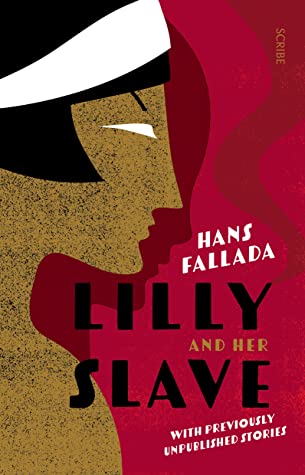Pages
▼
Saturday, 24 December 2022
Lilly and Her Slave by Hans Fallada Review
The six short stories that comprise this volume - Robinson in Prison, The Machinery of Love, Lilly and Her Slave, The Great Love, Pogg, the Coward, and Who Can Be the Judge? - were found in the papers of a psychiatrist whose patient in the mid-1920s was the writer Rudolf Ditzen, the real name of Hans Fallada. Three of them - Robinson, Lilly and Judge - are published here for the first time.
I’d like to say they’re as good as the previous books of Fallada’s I’ve read - Alone in Berlin, Nightmare in Berlin and Short Treatise on the Joys of Morphinism - but they’re none of them particularly good and it’s no great literary treasure that’s been unearthed here unfortunately.
Pogg, the Coward is interesting to an extent in that it’s very autobiographical (Fallada really did kill his childhood friend in a suicide pact gone wrong) revealing his feelings of guilt and perhaps shedding light on his self-destructive behaviour that led to his being institutionalised, which is where he wrote these stories.
The Great Love and The Machinery of Love are by far the two longest stories here and both are the life stories of two women. Great Love is about a woman who could probably be accurately described as having borderline personality disorder as we learn of her love of the man she would marry and how it changed over the years as they drifted apart, he cheated on her, etc. and her responses to that - obsessively clinging onto him and punishing him, but never letting him go, and so on.
The Machinery of Love is about a woman looking back at her life and relating the affairs she had, providing a glimpse into the bohemian natures of pre-WW1 Germany and particularly Weimar-era Germany too.
The new unpublished stories though are so very poor. Robinson in Prison is about being imprisoned, Lilly and Her Slave is about a young girl who slowly discovers her power over men, and Who Can Be the Judge? is a weird rambling hypothetical story about justice - I think. I’m really just guessing because they’re so forgettable that they didn’t leave any impression behind on me. All I know is that I didn’t like them and couldn’t have cared less while I was reading them.
Which can be said about the other three stories too. I remember Pogg, Great and Machinery more but I didn’t think they were especially brilliant stories and I can’t say I enjoyed them much either. Parts of them were fleetingly compelling but otherwise these are stories few people will find even mildly enthralling due to their meandering, unfocused, dull, and general pointless features.
I really do recommend Hans Fallada’s more famous books because, although the subject matter in them is grim, they’re also undeniably fascinating, well-written and memorable. But, even for fans of the author, I wouldn’t recommend Lilly and Her Slave because they’re the opposite of what I’ve just described - this is definitely the weakest of Fallada’s work that I’ve read so far and only of any value to literary historians of this writer.

No comments:
Post a Comment